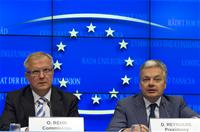EU is preparing to save Ireland, Dublin is hesitating
Ralitsa Kovacheva, November 19, 2010
 A joint EU-IMF mission began "technical talks" with the Irish authorities to intensify the preparation of the programme, under which the country could receive financial aid from the euro area rescue fund (European Financial Stability Facility, EFSF). In fact, the preparation has intensified since the weekend, Commissioner for Financial and Monetary Affairs Olli Rehn acknowledged.
A joint EU-IMF mission began "technical talks" with the Irish authorities to intensify the preparation of the programme, under which the country could receive financial aid from the euro area rescue fund (European Financial Stability Facility, EFSF). In fact, the preparation has intensified since the weekend, Commissioner for Financial and Monetary Affairs Olli Rehn acknowledged.
Following the ECOFIN meeting in Brussels, he was subjected to a real cross-fire from media who buried him with questions about the situation in Ireland. In his typical style, however, the Commissioner did not specifically respond to any question and with an icy voice reiterated repeatedly, that the situation had to be analysed first and then the necessary decisions to be taken. "Well planned is half done", Rehn summarised.
If we have to paraphrase this, we can say that the preparation of the programme is the first step toward obtaining funding. The mission in Dublin has to assess Ireland's fiscal stability, on the one hand, and the needs of the banking sector, on the other, Rehn said. In this sense, greater clarity will be brought by the 4-year consolidation programme of the Irish Government, which will be ready soon and is expected to represent a total consolidation effort of 15 billion euro.
As euinside wrote, the reason for the Irish difficulties is banks' restructuring, the costs of which is expected to reach 50 billion euros. So far, state aid to banks amounted to over 32.5 billion euro. This will lead to sky-high budget deficit of 32% of GDP - the biggest deficit in the euro area since the creation of the single currency in 1999.
Reporters demanded to know details about a possible rescue programme. For  example, how will it differ from the Greek one, because of the different type of problems: while in Greece public finances had to be saved, in Ireland the banking sector has to be restructured. In response, Commissioner Olli Rehn was concise and pointed out that whatever the purpose of the bailout would be, it must be linked to the government programme, because the EFSF cannot lend money directly to the banking sector.
example, how will it differ from the Greek one, because of the different type of problems: while in Greece public finances had to be saved, in Ireland the banking sector has to be restructured. In response, Commissioner Olli Rehn was concise and pointed out that whatever the purpose of the bailout would be, it must be linked to the government programme, because the EFSF cannot lend money directly to the banking sector.
The official European position at this stage is that Ireland has not yet requested assistance, but if there is a request, the EU is ready for action. The EFSF is already operational, unlike the Greek case, when the crisis fund had to be established urgently. EFSF CEO Klaus Regling said that the fund was ready to go to the market as soon as requested by Ireland. There is a large investors' interest, particularly from Asian investors, Regling said. The EFSF can provide funding within the 440 billion euros and the IMF participates in the mechanism with 50 percent of the amount given to the country concerned.
It is the market pressure that has caused the Irish problems in the past two weeks. The decision of the European Council, that private sector has to participate in a permanent crisis resolution mechanism, provoked fears among the holders of government bonds that they were at risk in case of bankruptcy. Therefore, even from the G20 meeting in Seoul, the finance ministers of the 5 largest European economies issued a statement that “whatever the debate within the euro area about the future permanent crisis resolution mechanism and the potential private sector involvement in that mechanism we are clear that this does not apply to any outstanding debt and any programme under current instruments. Any new mechanism would only come into effect after mid-2013 with no impact whatsoever on the current arrangements.”
Although markets are awaiting Ireland to request financial assistance from the EU any moment, the country maintains that it can handle it without external funding. Dublin has already announced that it is fully funded and has no need to return to the bond market until next summer. This does not apply to other "peripheral" economies in the euro area which, because of accelerated rise of interest rates, provoked by fears of Irish default, are unable to borrow money at reasonable rates. Spain and Portugal are pressing Ireland to accept European funding in order to calm markets, because otherwise the "contagion" will spread to the Iberian Peninsula.
The European Central Bank also insists Dublin to use financial assistance from the EFSF, rather than relying on the ECB to pour unlimited liquidity into troubled banks. Irish Finance Minister Brian Lenihan said that banks in the country have no funding problems and that the only reason for the country to seek assistance from the EU and the IMF is the attacks against the euro. For the Irish people the loss of fiscal sovereignty is a particularly sensitive topic and the idea of external financial assistance does not enjoy public support.
At their last meeting, EU finance ministers discussed the situation in Portugal and Greece too. Ministers “invite the Portuguese authorities to further specify such reforms, which shall aim at enhancing potential GDP growth and competitiveness by focusing on removing rigidities in the product and labour markets, including in wage formation, and improving productivity.”
On the occasion of Greece, Commissioner Olli Rehn noted, not without satisfaction, that these days for the first time Eurostat had confirmed Greek statistical data without reservation. According to recent data, the country's deficit for 2009 is 15.4%.
Updated data for the Bulgarian deficit for 2009 indicate that it was 4.7 percent, although preliminary data showed 3.9%. The difference between preliminary and final data (-640.9 million BGN) is a result of introducing the time adjustment method of cash incomes, Bulgarian National statistical Institute explained. “Through this method, on the basis of linking the accrual tax and social security payables with the data on cash incomes by types of taxes and social contributions, estimates are made what part of the accrued for the reporting year taxes and social contributions are paid as of the time of reporting.”
 Until the December European Council, EU Finance Ministers will focus their attention on Commission's proposals for economic governance of the Union. For this purpose, two working groups were formed – one for the EU-27 and one for the euro area. There will be an extraordinary ECOFIN meeting yet on the first day of the European Council, 16 December. Then it is expected leaders' decisions for the creation of a permanent crisis resolution fund for the euro area and for related changes in the EU Treaties to be finalised and announced.
Until the December European Council, EU Finance Ministers will focus their attention on Commission's proposals for economic governance of the Union. For this purpose, two working groups were formed – one for the EU-27 and one for the euro area. There will be an extraordinary ECOFIN meeting yet on the first day of the European Council, 16 December. Then it is expected leaders' decisions for the creation of a permanent crisis resolution fund for the euro area and for related changes in the EU Treaties to be finalised and announced.
 Klaus Regling | © Council of the EU
Klaus Regling | © Council of the EU Mario Centeno | © Council of the EU
Mario Centeno | © Council of the EU Mario Centeno | © Council of the EU
Mario Centeno | © Council of the EU Angela Merkel, Emmanuel Macron | © Council of the EU
Angela Merkel, Emmanuel Macron | © Council of the EU Benoit Coeure | © Council of the EU
Benoit Coeure | © Council of the EU Pierre Moscovici | © Council of the EU
Pierre Moscovici | © Council of the EU